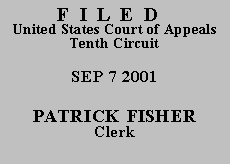

| DANIEL COLBERT, JR.,
Petitioner-Appellant, |
|
| v. | |
| SONNY SCOTT,
Respondent-Appellee. |
|
Petitioner Daniel Colbert, Jr., an Oklahoma state prisoner appearing pro se, seeks a certificate of appealability (COA) to challenge the district court's dismissal of his 28 U.S.C. § 2254 habeas petition. We deny a COA and dismiss the appeal.
In June 1986, Colbert pled guilty to two counts of robbery with a firearm, two counts of kidnaping, two counts of forcible sodomy, one count of first degree rape, and one count of first degree felony murder, all after former conviction of two or more felonies. He was sentenced to life imprisonment for the murder conviction and to concurrent terms of fifty years' imprisonment for each of the remaining convictions, with the concurrent terms to run consecutive to the life sentence. Colbert did not file a direct appeal. He filed an application for post-conviction relief in state court on April 24, 1997, which was denied on June 18, 1997. He did not appeal the denial to the Oklahoma Court of Criminal Appeals (OCCA). He filed a second application for post-conviction relief in state court on December 13, 1999, which was denied on July 12, 2000. The OCCA affirmed the denial of relief on April 6, 2000.
Colbert filed his federal habeas petition on May 4, 2000. The district court granted respondent's motion to dismiss, concluding the petition was not filed within the one-year limitations period set forth in 28 U.S.C. § 2244(d). The court denied Colbert's subsequent motion to voluntarily dismiss his petition without prejudice and denied his request for a COA.
In order for this court to grant a COA, Colbert must make a "substantial showing of the denial of a constitutional right." 28 U.S.C. § 2253(c)(2). Where, as here, a district court denies a habeas petition on procedural grounds without reaching the underlying constitutional claims, a COA should issue if the petitioner demonstrates "that jurists of reason would find it debatable whether the petition states a valid claim of the denial of a constitutional right, and that jurists of reason would find it debatable whether the district court was correct in its procedural ruling." Slack v. McDaniel, 529 U.S. 473, 478 (2000).
Having carefully examined the record on appeal, we are convinced the district court was correct in dismissing Colbert's federal habeas petition as untimely. As the court outlined in great detail in its order of dismissal, Colbert's one-year period for filing a federal habeas petition began running on April 24, 1996, and expired long before he filed his federal habeas petition. See Hoggro v. Boone, 150 F.3d 1223, 1225 (10th Cir. 1998) (noting that "for prisoners whose convictions became final before April 24, 1996, the one-year statute of limitation does not begin to run until April 24, 1996").
Colbert asserts the limitations period should be equitably tolled because he is "actually innocent" of the first degree felony murder conviction. See Miller v. Marr, 141 F.3d 976, 978 (10th Cir. 1998) (implying that equitable tolling of limitations period may be appropriate where petitioner is actually innocent). Colbert's assertion that he did not personally shoot the murder victim or intend that she die does not mean that he was "actually innocent" of first degree felony murder under Oklahoma law.(1) See generally Sawyer v. Whitley, 505 U.S. 333, 340-41 (1992) (discussing the meaning of the term "actual innocence"). Further, we agree with the district court that Colbert has failed to demonstrate that he diligently pursued his federal habeas claims, thereby preventing him from relying on any type of equitable tolling theory. See Miller, 141 F.3d at 978 (noting that equitable tolling applies only when an inmate diligently pursues his claims).
The application for COA is DENIED and the appeal is DISMISSED. The mandate shall issue forthwith.
Entered for the Court
Mary Beck Briscoe
Circuit Judge
*.This order and judgment is not binding precedent, except under the doctrines of law of the case, res judicata, and collateral estoppel. The court generally disfavors the citation of orders and judgments; nevertheless, an order and judgment may be cited under the terms and conditions of 10th Cir. R. 36.3.
1. We note that the facts now cited by Colbert were brought to the attention of the state district court at the time of Colbert's guilty plea. See Tr. of Hearing on 6/24/86, at 4 ("We would ask that the Record be perfectly clear, as far as the plea of guilty to the First Degree Murder Count. That Mr. Colbert we wanted it to be clear in the Record that Mr. Colbert was not the triggerman, did not shoot Lisa Thompson, never intended for Lisa Thompson to die, never wanted anyone to die, but that Mr. Colbert is pleading guilty to Felony Murder, that being the fact that a person died during the commission of a felony, that being the kidnapping of Trisha Monaco.").